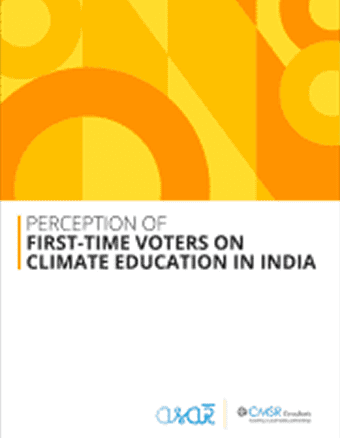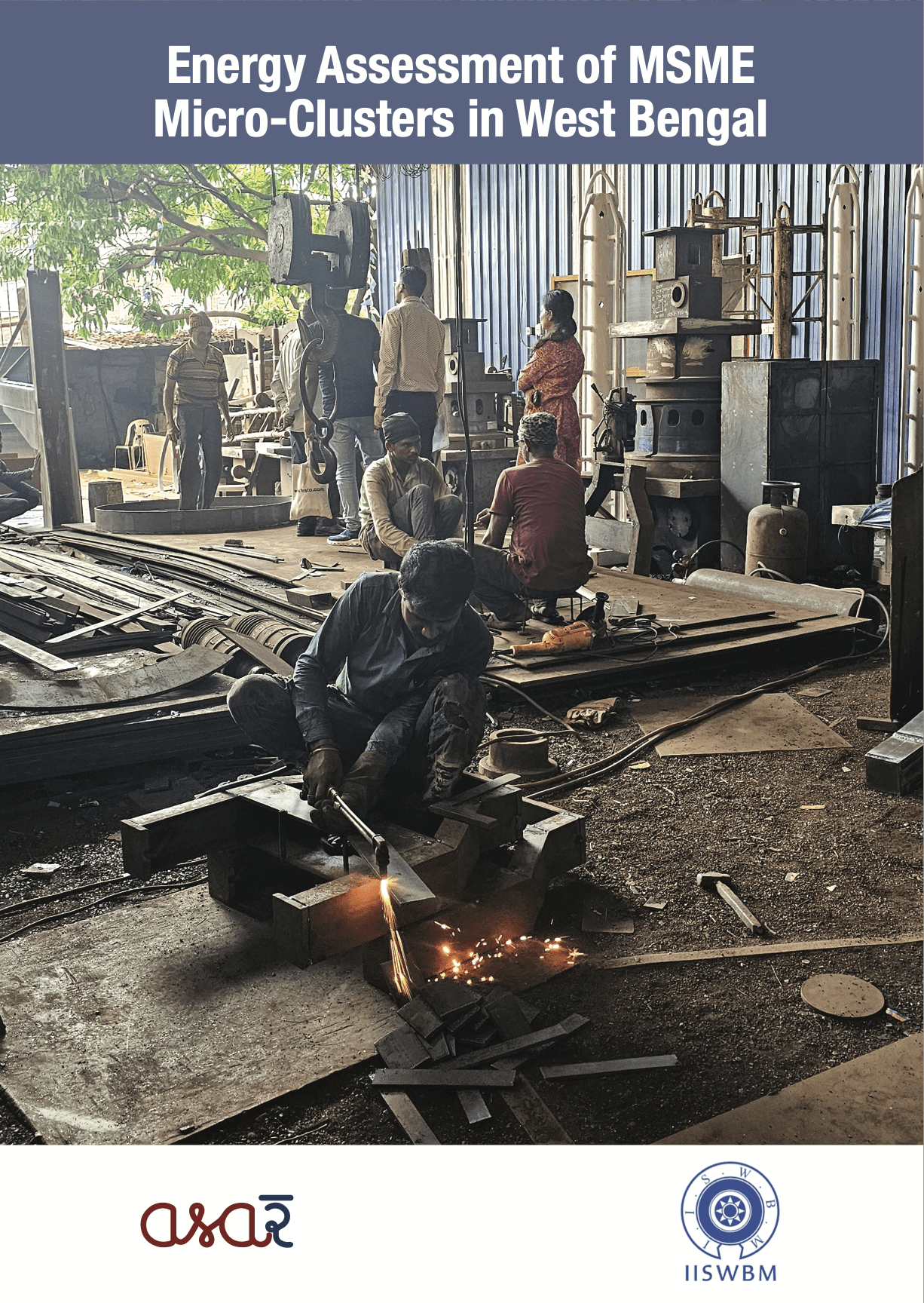or share via social media


Climate & Education
Maharashtra
Tamil Nadu
West Bengal
Perception of First-Time Voters on Climate Education in India
DownloadThis executive summary outlines the findings of a comprehensive study that aimed to understand first-time voters’ perceptions of climate education.
A. Context, Objectives & Methodology
The study recognizes climate change as a global challenge with profound implications for ecosystems, economies, and societies, primarily driven by human activities like fossil fuel combustion and deforestation. In India, climate change education is crucial for sustainable development due to its large population and diverse socio-economic landscape. Understanding first-time voters’ perceptions on this topic is vital for shaping effective policies and initiatives in India. The study focused on the perceptions of climate education among first-time voters in selected cities. It aimed to assess their awareness, the importance they place on it, their satisfaction levels, and their expectations regarding climate education through a survey conducted across seven cities in four states. The research used a mixed-method approach, combining quantitative surveys and qualitative focus group discussions. A total of 1600 first-time voters from seven cities across four Indian states participated, ensuring diverse demographic representation. Data collection followed ethical standards, ensuring voluntary participation, informed consent, confidentiality, and data protection.
B. Demographic Profile
The study had a relatively equitable gender distribution across locations, with variations in age, educational status, and household income. Most respondents were 18 to 22 years old, with educational backgrounds ranging from Intermediate/Sr. Secondary to Bachelor’s Degrees. Household income varied by state, with most falling into middle-income brackets.
C. Key Findings
- Quality of Environmental Education in Schools/Colleges: Responses varied regionally. In Delhi, 58% found it ‘average’ and 25% ‘poor’. In Maharashtra and West Bengal, the majority (47% and 58% respectively) rated it ‘good’. In Tamil Nadu, 39% found it ‘good’ and 25% ‘average’.
- Coverage of Climate Change Topics: Common topics included global warming, greenhouse gas emissions, renewable energy, and biodiversity loss. However, most participants were dissatisfied with the lack of depth and solution-oriented approaches. There was a common sentiment of inadequate coverage and a lack of practical solutions, despite some detailed discussions on specific aspects. Participants emphasized the need for practical solutions, integration of sustainable development goals and waste segregation, and mandatory, unbiased climate education with adjusted credit scoring. A notable lack of awareness about climate change causes and consequences was observed, highlighting a need for more knowledge dissemination. Comprehensive and in-depth coverage of topics like global warming, medical waste management, acid rain, ozone depletion, and industrial pollution was emphasized, along with detailed information on mitigation and reversal strategies. Educating students on mitigation measures such as reducing greenhouse gas emissions, transitioning to renewable energy, sustainable land-use practices, and enhancing climate impact resilience was also suggested.
- Adequacy of Information: While many respondents felt adequately informed about climate change causes and consequences through education, qualitative findings indicated that the knowledge imparted was insufficient.
- New Learning About Climate Change: In Maharashtra, West Bengal, and Tamil Nadu, 93%, 89%, and 82% of respondents, respectively, reported learning new and significant aspects of climate change in school. In Delhi, only 23% reported the same. Focus group discussions (FGDs) revealed learning about different environments, biodiversity, the greenhouse effect, endangered species, the impacts of human activities (deforestation, factory emissions, excessive farming with chemical fertilizers and pesticides leading to rising temperatures), and the importance of conserving resources and promoting the “three Rs” (Reduce, Reuse, Recycle).
- Confidence in Understanding Climate Change: A majority of respondents from Delhi (67%), Tamil Nadu (61%), West Bengal (57%), and Maharashtra (44%) expressed some confidence in their understanding of climate change, indicating room for improvement in education and awareness. Participants from Coimbatore noted that climate education often emphasized facts over critical thinking, leading to under-confidence in understanding climate change and mitigation strategies, and highlighted the superficial inclusion of Environmental Studies in college. Kolkata participants mentioned being introduced to basic concepts but lacked comprehensive understanding.
- Integration of Climate Change Knowledge into Daily Life: Approximately 63% to 95% of respondents adopted climate knowledge in their daily lives, with higher education correlating with increased adoption. Qualitative discussions revealed practices such as using public transport, college initiatives like banning single-use plastic, embracing solar energy, avoiding water waste, segregating waste, using reusable bags and water bottles, and switching to bamboo toothbrushes. Participants also engaged in tree planting and plastic reduction.
- Emotional Responses to Climate Change Education: Hopelessness, fear, and anxiety were prevalent emotional responses, suggesting a need for education that addresses emotional well-being and fosters resilience.
- Significance of Incorporating Climate Education into Learning Systems: A significant majority of respondents from West Bengal (89%) and Delhi (86%), and over half from Tamil Nadu and West Bengal, considered incorporating climate awareness into climate education “extremely important” or “very important”. FGDs emphasized early exposure to climate education to increase environmental awareness and empower future decision-makers, fostering sensitivity and potentially reducing activities contributing to climate change.
- Key Benefits of Climate Education in the Curriculum: Respondents highlighted benefits such as empowering students to understand and address climate challenges, promoting sustainable practices, fostering global citizenship, and shaping environmentally conscious individuals capable of informed decisions and contributing to a healthier future.
- Contextualizing the Climate Crisis: Respondents expressed varying concerns across regions. While economic and public health crises received widespread attention, the climate crisis was significantly recognized, particularly in West Bengal and Delhi. Views on responsibility differed, with some attributing it to individual citizens, governments, industries, or a combination.
- Effective Strategies to Tackle the Climate Crisis by Government: Suggested strategies included enhancing sustainable transportation infrastructure (87% in West Bengal, 74% in Delhi), implementing stricter carbon emission regulations (80% in West Bengal, 72% in Delhi), and conducting climate education and awareness programs (55% in Tamil Nadu, 52% in Maharashtra). Prioritizing renewable energy development and utilization was also suggested.
- The Importance of Tackling the Climate Crisis as a Shared Global Responsibility: A consensus emerged that addressing the climate crisis is a shared global responsibility, with the majority agreeing on the necessity of collaborative efforts. Specifically, 95% from Delhi, 94% from West Bengal, 72% from Tamil Nadu, and 71% from Maharashtra strongly agreed or agreed that finding solutions should be a collective global effort.
- Expectations from Political Candidates and Parties: While a notable majority in Maharashtra (83%) expressed confidence in the government’s climate change efforts, a significant portion in West Bengal (66%), Tamil Nadu (62%), and Delhi (60%) shared similar sentiments. However, qualitative discussions revealed a more critical outlook, highlighting perceived governmental deficiencies and the demand for more decisive action. These discussions pointed to a lack of accountability, the need for enhanced collaboration, and the urgency of effective climate change measures, leading to various recommendations for mitigating impacts and fostering sustainable practices.
- Engaging Students in Climate-related Initiatives and Awareness Programs: Suggestions for fostering environmental stewardship included integrating climate initiatives with existing campaigns, promoting practical engagement through fieldwork and internships, mandating community service, organizing workshops and meetings, facilitating hands-on activities like plantation drives, and incentivizing student participation.
- Political and Personal Power Sentiments: In West Bengal, Tamil Nadu, and Maharashtra, a significant portion felt they could make themselves heard by decision-makers. In Delhi, however, the majority disagreed, indicating a lack of confidence in influencing decisions. Similarly, while many in West Bengal and Tamil Nadu felt their voices were heard in their communities, most in Delhi disagreed. Despite these disparities, respondents across all regions generally believed in their power to effect change in important matters and felt confident in controlling their career and professional development. A considerable proportion in West Bengal and Maharashtra believed they could influence community decisions, while fewer in Tamil Nadu and Delhi shared this.
- Political Engagement, Optimism, and Nostalgia: While a significant portion in West Bengal and Maharashtra felt disengaged from the political system, half in Tamil Nadu and less in Delhi disagreed. A substantial majority in West Bengal, Delhi, and Maharashtra believed the past was better than the present, contrasting with Tamil Nadu. Despite this, respondents from West Bengal, Delhi, and Maharashtra were optimistic about solving societal crises, while a lower percentage in Tamil Nadu shared this view. Furthermore, respondents from West Bengal, Delhi, and Maharashtra were confident their children would have a better life, a sentiment not as widely shared in Tamil Nadu. Finally, a majority from West Bengal, Delhi, and Maharashtra wished for simpler times, while a smaller proportion from Tamil Nadu endorsed this.
D. Conclusions
The study’s findings offer valuable insights into first-time voters’ perceptions of climate education in India. There is a clear recognition of climate education’s importance, but notable disparities exist in its quality and depth across regions. Key areas for improvement include enhancing coverage depth, integrating practical solutions, and ensuring cultural relevance in the curriculum. Respondents strongly agreed on incorporating climate education into formal learning systems from an early age, emphasizing practical knowledge and interdisciplinary perspectives. Participants also stressed the importance of political commitment to addressing climate change, indicating growing voter awareness of environmental sustainability’s influence on political decisions. Efforts to engage students in climate-related initiatives and awareness programs were deemed crucial for fostering environmental stewardship. Additionally, the study highlighted the need to empower individuals to believe in their capacity for both personal and political change.


